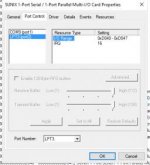Chuck(G)
25k Member
Several of my systems lack parallel ports and this is a bit annoying at times. It forces me to go looking for a system with a parallel port.
I've seen several PCIE parallel port boards, such as this one.
Are these special-case items requiring drivers or can I boot MS-DOS and access these? Anyone know?
I've seen several PCIE parallel port boards, such as this one.
Are these special-case items requiring drivers or can I boot MS-DOS and access these? Anyone know?

